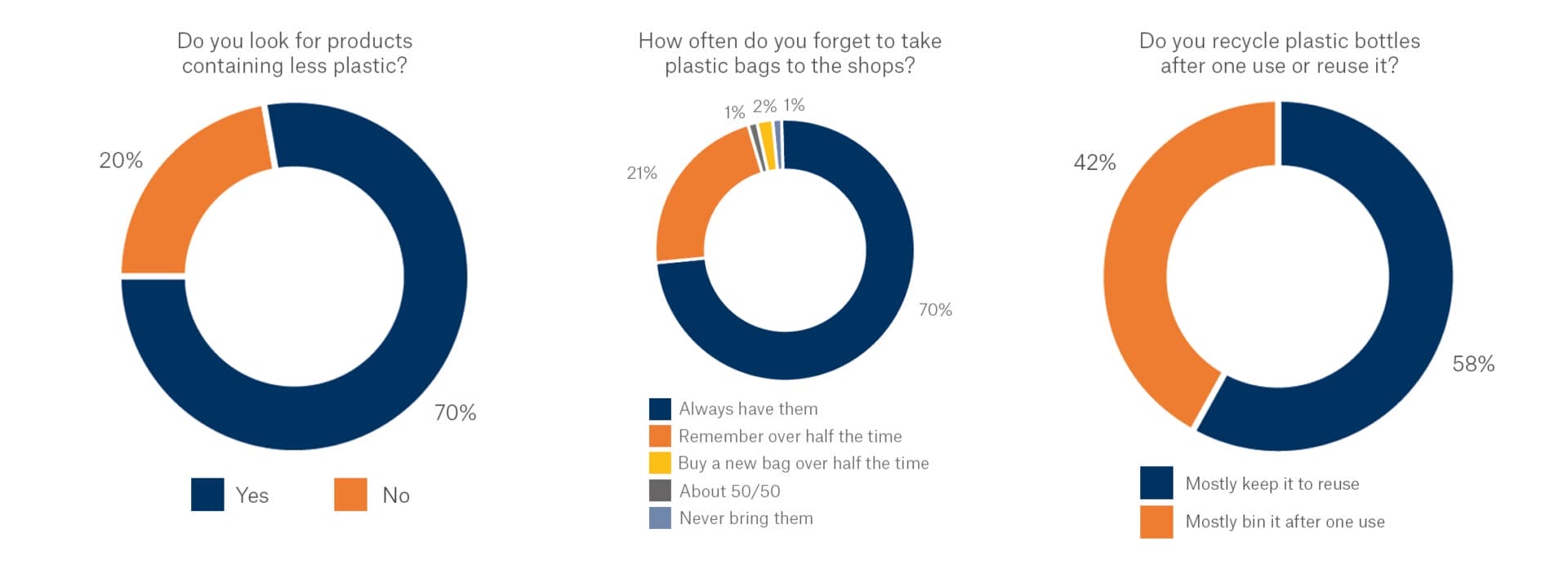Consumer survey - plastic, not so fantastic
Leatherhead has recently run a survey with its UK database of consumers to understand their attitudes towards plastic reduction. At the centre of the plastic debate lies the consumer with key figures like David Attenborough and the Ellen MacArthur foundation sparking the public’s interest. Their concern is highlighted with 46% of UK people saying that they feel guilty about the amount of plastic they use.[1]
Of the people surveyed by Leatherhead, 70% are actively looking for products that contain less plastic in their everyday shopping. The increased awareness means that a similar number (71%) also say they always have plastic bags with them, and an additional 20% say they have them over half of the time they head out to the shops.
Membership
Membership of Leatherhead gives access to the member helpline for advice on regulations, product development, nutrition, safety and consumer research.

But is it just the increased awareness causing people to be warier about plastic shopping bags?
In 2015 in England, a single-use plastic carrier bag charge was introduced. This charging system has seen plastic bag sales in the ‘big seven’ supermarkets drop by 86% since the government enforced charge[2], with figures showing that this has resulted in a decrease of nearly 300 million bags compared to 2016/17.
All positive you may think, but in contrast, single use plastic bottles have no value chain in the UK. Leatherhead’s survey shows that nearly half of the people we surveyed (42%) throw their plastic bottles straight in the bin after one use.
Following the European Parliament’s Single-Use Plastic (SUP) initiative, France has an ambitious plan to recycle all its plastic packaging by 2025. To do this, amongst other tax schemes which see plastic products being increased in cost by around 10%[3], in 2018 it introduced a plastic bottle collection scheme. This scheme encourages consumers to return their bottles back to the store and in return they receive a small sum of money. This gives the bottle a value to the consumer who is encouraged to return them and then the government can guarantee that those bottles are then recycled and not sent to land-fill. Before its introduction only 25%[4] of French plastic was recycled, it remains to be seen if this scheme will be a successful way of fighting France’s war on plastic.
In 2011, Norway introduced a similar scheme which is seeing unarguable success. 97% of all plastic bottles are being recycled, 92% of them to such a high standard that they can be turned back into plastic bottles[5]. It also has a tax-based system which incentivises the companies who collect used bottles through a deposit scheme by offering a tax rebate based on the proportion returned, and this has achieved a 95% return rate.
British consumers are aware of the damage plastic is doing to the environment but for many, their actions don’t always follow through to match these feelings. When something is incentivised, people are now more likely to bring their own bags shopping with them than ever before. With other plastics which are considered to have no value to the consumer like plastic bottles, this doesn’t encourage as many people to recycle as we may hope.
Clearly, increased consumer awareness is working to change people’s opinions to an extent, which is only a positive thing for the environment. Encouragingly, 58% of people Leatherhead surveyed said that they kept their plastic bottle and reused them. With the UK committed to eliminating all plastic waste by 2042, adding value to recycling is clearly going to inspire UK consumers to continue to improve its recycling behaviour.
The problem of plastic is a complex one. Leatherhead’s sister company Sagentia has explored the issue in more detail in several papers including 'Breaking up with plastic: the direct-to-consumer opportunity' and in the videos 'Conventional plastics and bioplastics: How can we move from the former to the latter' and 'Finding creative yet achievable solutions to plastics reduction'.
Contact us [email protected]
T. +44 1372 376761
You might be interested in...
[1] https://www.theguardian.com/environment/2019/apr/19/half-of-uk-consumers-willing-to-pay-more-to-avoid-plastic-packaging-survey-shows
[2] https://www.gov.uk/government/news/plastic-bag-sales-in-big-seven-supermarkets-down-86-since-5p-charge
[3] https://www.plasticstoday.com/packaging/france-will-introduce-plastic-packaging-tax-2019/1049716459277
[4] https://www.telegraph.co.uk/news/2018/08/12/france-set-penalities-goods-packaged-non-recycled-plastic-2019/
[5] https://www.theguardian.com/environment/2018/jul/12/can-norway-help-us-solve-the-plastic-crisis-one-bottle-at-a-time
